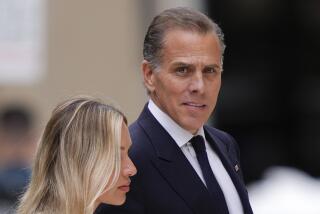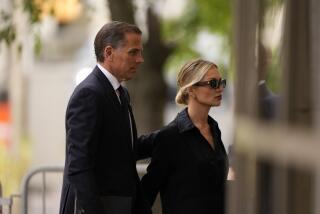Concern delayed the case against Bonds
- Share via
SAN FRANCISCO -- Internal political considerations and concern among federal prosecutors that their case against baseball star Barry Bonds might not be strong enough delayed his perjury and obstruction of justice indictment for more than a year, according to a former FBI official familiar with the case.
During that year, Bonds completed his last season with the San Francisco Giants without the threat of a suspension and overtook baseball legend Henry Aaron to set the home run record.
What prompted prosecutors to finally proceed with the criminal case this week was not clear, but there was no indication of major breakthroughs or significant new evidence.
“We pretty much were ready to go more than a year ago,” said the former official, who spoke on condition of anonymity because the criminal case is pending.
“The question was what would happen to someone’s career if they took this case and didn’t win it,” the former official said. “They wanted assurances” they would win a conviction.
The ex-FBI official said then-U.S. Atty. Kevin Ryan -- later among the U.S. attorneys fired in a controversial Justice Department housecleaning -- “was already in trouble politically” and reluctant to take on such a high-profile case unless it was ironclad.
Celebrity cases “had to be dead-bang,” the former FBI official said, adding that investigators were confident they had sufficient evidence to support the charges. They also were hoping for cooperation from Bonds’ personal trainer, who went to prison rather than testify in the case.
“Whenever you have an allegation like that, you never have just one source. We had several sources besides him, a variety of sources,” the onetime FBI official said.
Calls to Ryan’s private law office on Friday were not returned. He told the San Francisco Chronicle on Thursday that “the government has to make sure you have things lined up and that you’ve crossed your proverbial Ts and dotted your I’s” in such cases.
A day after a federal grand jury here indicted baseball’s new home run king, legal experts weighed in with a wide array of opinions on the strengths and weaknesses apparent so far in the government’s case.
“It’s a defensible case,” said veteran defense attorney Michael Shapiro in New York. “Perjury cases turn on technicalities. A person who understood that is [former President] William Jefferson Clinton, who once famously said the definition of one of his answers depended on what the definition of the word ‘is’ is.
“Bonds is no Clinton, but prosecutors still have to prove what was going on in his mind when he said what he said.”
San Francisco attorney Hugh Levine, a former county prosecutor who represented Bonds’ former girlfriend, Kimberly Bell, when she appeared before the grand jury, said he was struck by the ambiguity of questions put to Bonds.
“My impression is the questions were posed poorly and imprecisely, and for a prosecutor trying to pin down a witness on perjury, [it was] a poor job. I thought the questions were loosey-goosey and informal almost to the point of being unprofessional,” Levine said.
“Perjury is a crime that requires a high degree of precision,” Levine said, adding that the questions that elicited the allegedly perjurious answers were something less than that.
“For example, using the word ‘steroids’ brings in imprecision because steroids are not illegal. . . . It is possible that the prosecution meant unlawful steroids, controlled steroids. That is what they have to make clear. . . . I would imagine the defense will use professors of linguistics [to testify] about words and multiple meanings.”
Bell has said that Bonds told her he was using steroids but that she did not see him taking them. Levine said there is a strong circumstantial case to be made that Bonds was using performance-enhancing drugs, because his physique changed and because he had a connection through his trainer to the Bay Area Laboratory Co-Operative, or BALCO, a steroid distribution lab.
“That is one thing,” said Levine. “Proving that those few sentences pulled out of his grand jury testimony are lies is another thing.”
Former federal prosecutor Walt Brown, now a white-collar-crime defense attorney in the Bay Area, said he didn’t question the questioning, but he wondered: “What’s their proof [that Bonds lied]? What’s their evidence?”
He said the case “will depend on some circumstantial evidence, or statements he made to other people. They need to prove he knew he was taking a steroid.”
Bonds was called to testify in December 2003 before a grand jury investigating BALCO, which counted the San Francisco Giants slugger and several other high-profile and Olympic athletes as clients. He was granted immunity, but not from perjury.
In the indictment, authorities underlined excerpts of Bonds’ testimony that they allege to be untruthful and deceptive.
“But there are very few stark black-and-white answers,” according to defense lawyer Shapiro.
The one that most troubles Shapiro is a later exchange about Bonds’ acceptance of a product from his personal trainer, Greg Anderson, that Bonds testified he believed to be flaxseed oil.
“Q: And weren’t you getting this flaxseed oil stuff during [January 2002]?”
“A: Not that I can recall. Like I say, I could be wrong. But I’m . . . I’m . . . going from my recollection it was, like, in the 2002 time and 2003 season.”
The indictment listed that response among the perjury examples.
“How that can be perjurious is beyond my wildest imagination. It’s nuts,” Shapiro said. “He’s saying he doesn’t recall something. Calling something like that a lie can backfire . . . for a jury.”
He said the case “will not be easy, unless they have him talking on tape.”
Rory Little, a professor at UC Hastings College of Law and a former federal prosecutor, said the case “is going to depend on what the truth is, and not so much the wording of the indictment. The hard part of perjury cases is proving the defendant knew what the truth was and knew that what he was doing was taking steroids.”
Even if the prosecution can prove its case, Little said, that does not necessarily translate into a guilty verdict against Bonds.
“It seems very likely to me that he has got to take the stand in this case,” he said. “It is going to come down to his word against some government witnesses and maybe some documents.”
Jury selection will be hugely important, he said, noting that -- to some people -- convicting baseball’s home run champion “would be like putting Babe Ruth in jail.”
Sacramento defense attorney William Portanova, who worked as a federal and state prosecutor for 17 years, said the questions by the prosecutor and Bonds’ answers both featured “sloppy language,” which can be problematic in terms of proving perjury.
“Perjury is not like a mathematical equation where there is a right answer and a wrong answer,” he said. “It looks like the theme [of the questions] was: Did you knowingly take steroids? And the primary theme of the response is: no.
“It is possible he believes he was not taking steroids but rather was being given some other type of enhancements, medications or creams. But the way this case is going to be won or lost is based on the government’s investigation. If the government can prove Bonds knowingly was taking steroids, then he is in serious trouble.”
Reiterman reported from San Francisco; Krikorian and Pugmire reported from Los Angeles.
More to Read
Go beyond the scoreboard
Get the latest on L.A.'s teams in the daily Sports Report newsletter.
You may occasionally receive promotional content from the Los Angeles Times.











